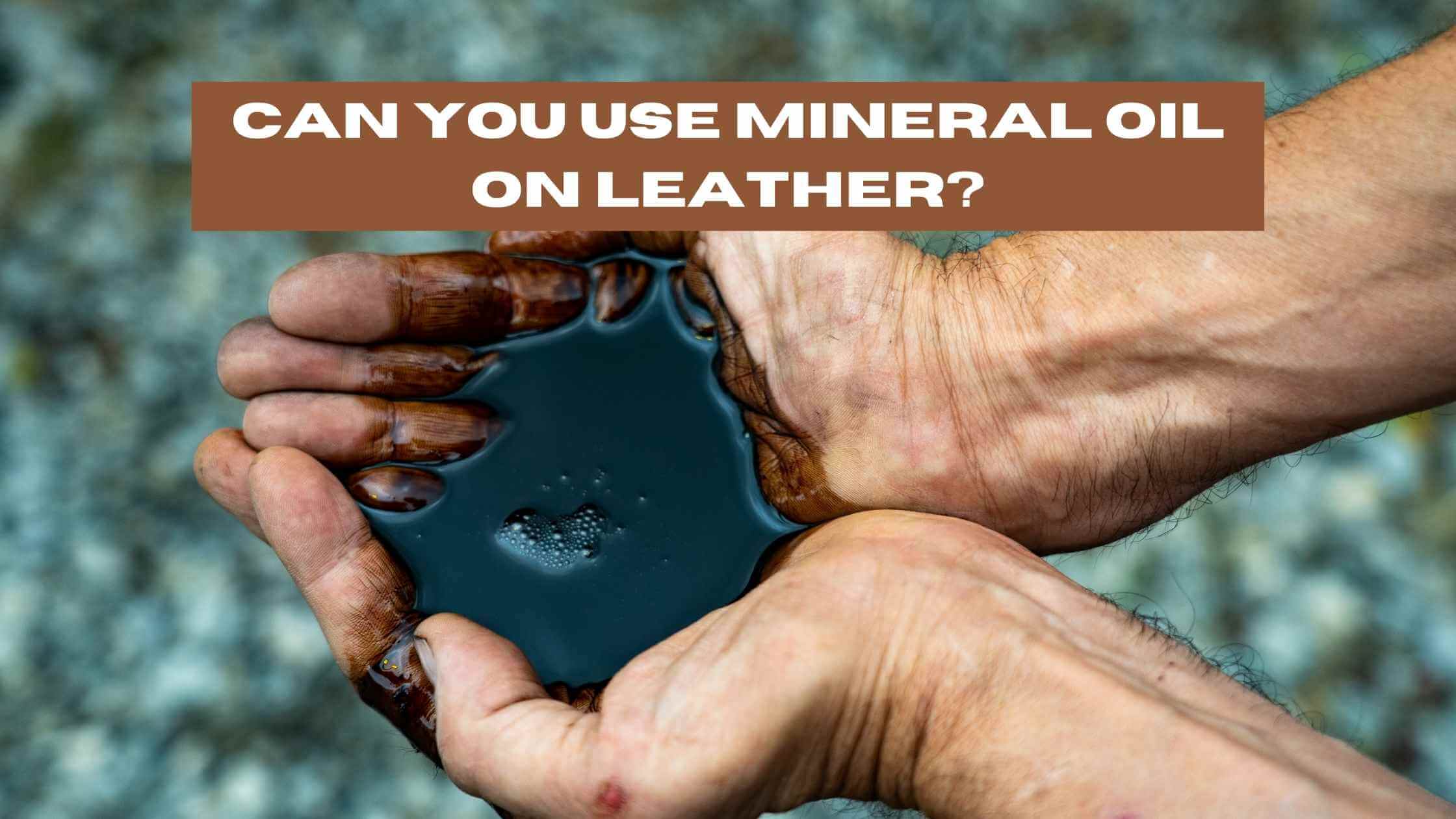When it comes to maintaining your leather goods, you might wonder if using mineral oil is a suitable option. Understanding the effects of mineral oil on leather is essential to ensure the longevity and appearance of your leather items.
Using mineral oil on leather can soften and waterproof certain types of leather, making it more comfortable and easier to maintain. However, it may also lead to discoloration and damage over time, making it a less desirable option compared to natural oils specifically designed for leather care.
Instead of resorting to mineral oil, there are numerous natural oils that are safe for leather maintenance, such as mink oil, coconut oil, neatsfoot oil, and almond oil.
What Is Mineral Oil?
Mineral oil is a clear, odorless liquid that is derived from petroleum. It is a common ingredient in many household products, such as cosmetics and personal care items, due to its moisturizing and lubricating properties.
Mineral oil is generally considered safe for use on a variety of materials, but it is important to understand whether it’s appropriate for your specific needs, such as using it on leather.
There are two main types of mineral oil: food-grade and industrial. Food-grade mineral oil is used in the preparation and processing of certain foods, as well as in many personal care products like lotions and lip balms. Industrial mineral oil, on the other hand, is used for various mechanical and industrial applications, such as lubricating machinery and automotive parts.
When considering mineral oil for leather care, it’s essential to know that mineral oil is an ingredient in some leather oils and conditioners. It can help to soften and waterproof leather, but it’s not something you should use on its own for leather care. Using the appropriate oil or conditioner specifically designed for leather is crucial for preserving the material’s quality and longevity.
Is Mineral Oil Good for Leather?
While mineral oil is commonly used in a variety of applications, it’s crucial to consider whether it’s suitable for your leather items. It’s true that mineral oil can soften and condition certain types of leather, but it also has potential downsides when applied to this particular material.
Using mineral oil on your leather products may lead to discoloration and can even cause the leather to become overly soft or damaged over time. This is because mineral oil, being a petroleum-based product, is known to dry out leather.
Instead of relying on mineral oil, consider using natural oils to treat your leather items. Examples of more suitable alternatives include mink oil, coconut oil, neatsfoot oil, and almond oil. These oils are less likely to cause adverse effects on your leather, keeping it well-conditioned and maintaining its appearance.
When caring for rugged, rigid leather boots or items that require additional softening, using leather oils containing mineral oil might be appropriate, but they should not be applied to already soft leather. Exercise caution and always test any treatment on a small, inconspicuous area before applying it to the whole item.
Pros and Cons of Using Mineral Oil on Leather
Figuring out whether or not to use mineral oil on leather can be a bit tricky. Below we’ll explore the advantages and disadvantages of using mineral oil for leather care. By understanding both sides, you’ll be better equipped to make an informed decision for your leather items.
Pros of Mineral Oil for Leather
Mineral oil can have some benefits for treating certain types of leather, especially when it comes to rugged and rigid leather boots. We’ve outlined some of the pros below:
- Ability to soften leather: Mineral oil can help soften rugged and rigid leather, making it more comfortable to wear and easier to break in.
- Water resistance: Some types of mineral oil, like mink oil, can help waterproof leather.
Cons of Mineral Oil for Leather
Although there are potential benefits to using mineral oil on leather, it’s important to weigh in the disadvantages. Here are some of the cons of using mineral oil on leather:
- Discoloration: Mineral oil can cause your leather to lose its original color and become discolored, potentially ruining the appearance of your leather items.
- Potential damage: The dry nature of mineral oil can actually cause leather to become damaged, discolored, and softened over time.
- Cracking: When the leather loses its texture from the use of mineral oil, it can crack easily.
- Over-penetration: Mineral oil should not be used on already soft leather since it can over-penetrate, potentially causing further damage.
As you can see, the cons outweigh the pros. While mineral oil can be a cheap and accessible option for conditioning and shining leather, its potential to cause long-term damage makes it a less desirable choice compared to products specifically designed for leather care.
Tip: If you're still going to use mineral oil on your leather goods, make sure to apply it in a well-ventilated area. Mineral oil can produce fumes that can be harmful if inhaled in large quantities. It's also a good idea to wear gloves to protect your hands from the oil and to avoid getting it on your clothes.
Alternatives to Mineral Oil for Leather Care
While mineral oil can be used on leather, there are other oils that serve as effective alternatives for leather care. These oils can help rejuvenate and protect the leather, providing a natural shine and softness to your favorite leather items.
Beeswax and Castor Oil Conditioner: Beeswax works as a natural waterproofing agent, while castor oil provides moisture and softness.
You can create a homemade leather conditioner by melting beeswax and castor oil together in a glass measuring cup placed in a saucepan of water on medium heat. Once completely liquid, pour the mixture into a glass storage container and allow it to cool before using. Store the conditioner in a cool, dry place away from sunlight.
Mink Oil: Mink oil is derived from the mink animal and has been used for centuries to condition leather. Its unsaturated fats make up about 70% of the oil, helping to give the leather fibers flexibility and durability. To use mink oil, simply apply a thin layer on the leather surface and rub it in with a soft cloth until it is fully absorbed.
Lemon Essential Oil: Lemon essential oil can be a natural and effective option for cleaning and conditioning leather. To try this eco-friendly approach, simply dampen a soft, clean cloth with 10 to 15 drops of lemon essential oil. Gently massage the leather surface with the infused cloth, and watch as it works to eliminate dirt and grime, all while providing a subtle shine to the leather.
While mineral oil may seem like a cheap and accessible option for maintaining your leather goods, it can potentially cause more harm than good. Mineral oil has the potential to dry out, discolor, and damage leather over time. Instead, consider using natural oils that are specifically designed for leather care, such as mink oil, coconut oil, neatsfoot oil, or almond oil.
Remember to exercise caution and test any treatment on a small, inconspicuous area before applying it to the whole item. By using appropriate oils and conditioners, you can help preserve the longevity and appearance of your leather items.
FAQ: Mineral Oil on Leather
Can I use leather oil, like coconut oil or olive oil, on my leather couch or jacket?
Yes, many people use oils like coconut oil or olive oil to condition their leather goods. However, be cautious, as some oils can darken the leather. Always test a small, less visible area first to check how the leather reacts.
Is coconut oil good for my leather products, compared to other kinds of oil?
Coconut oil can condition and soften the leather, but it might darken the leather color compared to other oils. A small patch test is recommended before applying it to the entire surface of the leather.
Can I use baby oil or olive oil on my old leather boots to soften them?
Baby oil or olive oil can be used to condition and soften old leather boots, but they may alter the color and quality of the leather. Always apply a small amount first to see the results.
How can I apply mineral oil or mink oil to my leather couch without damaging it?
To apply mineral oil or mink oil, first clean the leather surface. Put a small amount of oil on a cloth and rub it into the leather in a circular motion. Allow the oil to soak in before using the couch. Repeat this process periodically to maintain the leather and prevent damage.
Does using an oil like coconut or mink oil on leather goods help clean them?
Oils like coconut oil or mink oil can help in cleaning the surface of the leather by removing dust or dirt. However, for deep cleaning, a specialized leather cleaner is recommended. Remember that oil can darken some types of leather.
Can I use olive oil or coconut oil to restore my old, dried-out leather products?
Yes, olive oil and coconut oil can help to restore and revitalize dried-out leather by providing necessary moisture. However, they should be used sparingly as they can darken the color of the leather. Test a small spot first before applying these oils all over the leather product.
Can I use neatsfoot oil as a leather treatment on my leather goods?
Neatsfoot oil is a natural product that has been used to condition and maintain leather for centuries. It can soften and preserve your leather goods. However, like other oils, it can potentially darken the leather, so it’s important to test it on a small, less visible area first.
What is the best oil to keep my leather couch and other leather goods in good condition?
While many types of oil can be used to condition and maintain leather, the best oil for leather is still a matter of personal preference. It depends on the type of leather and the desired finish. Testing different types of oil, such as coconut, olive, mineral, and mink oil, on an inconspicuous area of the leather can help you decide which one works best for your needs.
Can I use coconut oil instead of a commercial leather care product?
While coconut oil can condition and clean leather to an extent, it’s not always a substitute for a commercial leather care product, which are specifically designed to care for leather in the best possible way. Always do a patch test before applying any kind of oil to your leather goods.
Can oil stains on my leather jacket or couch be removed, and how?
Oil stains on a leather couch or jacket can be tricky to remove. A leather cleaner designed for oil or grease stains is typically the best solution. Don’t apply more oil in an attempt to remove the stain, as this can worsen the problem and potentially damage the leather.

